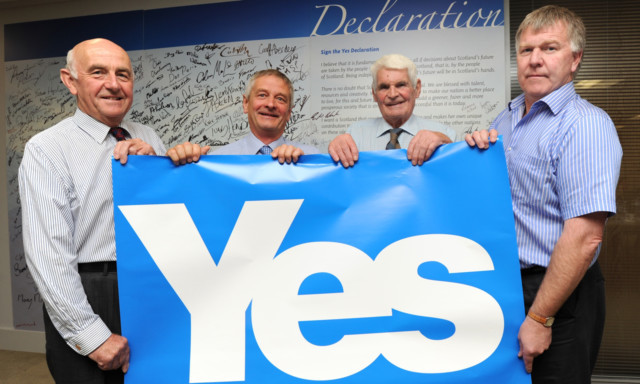On Wednesday morning four farmers were found in Hope Street in Glasgow’s city centre. Your first thought may be that they were lost, but actually they had come together to call for the farming community in Scotland to get behind a “yes” vote.
Gathered in Yes Scotland’s headquarters, four of the biggest players in Scotland’s farming community John Ross, Jim Walker, John Kinnaird and John Cameron, all former presidents of the National Farmers Union of Scotland (NFUS), urged Scotland’s 65,000 farmers, crofters and growers as well as the 250,000 others who depend of agriculture for their living to follow their lead.
This is an unprecedented intervention from Scotland’s farming elite.
Their experience spans 24 years of NFU presidency and all the major EU reforms on agricultural policy.
The farming vote is sizeable, and one that certainly hasn’t traditionally been pro-independence by any means. If someone said to me five years ago I would be sitting in a room with four of Scotland’s top farmers announcing their support for independence, I, like many of my colleagues, would have said “dream on”. And with hundreds of farmers out campaigning with the Farmers for Yes group, the movement is growing by the day.
Having spent some time talking to the farming community, the case for an independent Scotland seems to be one of the most pressing.
Annually farmers contribute £2.7 billion to the Scottish economy. But the main problem is that this clout hasn’t been realised in terms of representation or decision making by UK governments. Indeed, it seems farmers and rural communities are not just being ignored at UK level, decisions have been made which are actively damaging them. And it’s happening at EU level too, as demonstrated by the recent decisions on convergence payments.
Eighty-five percent of our land is classified as “less favoured” compared to 17% of the land in England. So Scotland has very different agricultural needs and priorities from the rest of the UK and it’s significantly more important to the Scottish economy than to the UK’s as a whole.
But these differences are not represented, indeed Scotland has no voice in key decision making in these areas in Europe. Successive Westminster governments have even argued for major reductions in agricultural support payments.
Westminster has now negotiated Scotland to the bottom of the CAP league tables, negotiating the lowest direct farm payments in the EU by 2019 and has deprived Scottish farmers of the 230 million euro convergence uplift payments approved by Europe and fought for by the Scottish Government.
Ignored by Westminster, no voice in Europe and the lowest funding for rural development in the whole of Europe, it’s no wonder our food producers are looking for a better system of governance.
The good news is with responsibility comes opportunity and independence can offer five key gains for this sector.
One, a direct voice in Europe and a seat at the top table to negotiate Scottish priorities as part of a new voting system in Europe the new system giving one vote per member state meaning more power to smaller members.
Two, more funding if Scotland had been a member state the recent formula would have delivered 1 billion extra for Scottish farmers and additional rural development funding like Ireland who currently get six times more than Scotland.
Three, targeting our international export markets, prioritising the lucrative markets where Scottish produce is in high demand. The UK Government is completely failing to do this, particularly in key markets such as Japan.
Four, being part of the EU. Currently the biggest threat to EU membership is the UK Government. One of the former NFUS Presidents to declare their support for independence yesterday, John Ross, said: “Farming and rural affairs need to be at the forefront of all future Scottish government thinking and being fully committed members of the European Union is an essential part of that policy. An independent Scotland is the only way that this can be secured. A ‘no’ vote will mean years of uncertainty about a UK government’s EU membership and commitment and this will have very serious consequences for the future of Scottish farming.”
Five, a guarantee to underwrite the Single Farm Payments to farmers in the period between a “yes” vote and Scotland taking its place as a full EU member. Something, which the UK Government has refused to do in the event of a “no” vote.
Time and time again Westminster has failed farming and has failed Scotland. It’s time for a system change, for Scotland to be represented and for the people of Scotland to be in the driving seat.
